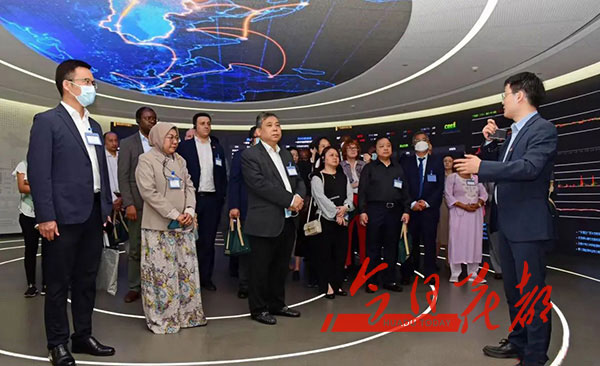China Emissions Exchange Guangzhou Leads in the World in Cumulative Trading Volume and Turnover; Huadu China's No. 1 in "Selling Air"

Did I hear it wrong?! It is true! Huadu is selling air, and has become the No.1 seller in China! However, the "air" is not just any air, it is carbon emission rights. "Selling air" actually refers to carbon emissions trading.
Recent news from China Emissions Exchange Guangzhou in Huadu District shows that relying on the "test field" of green finance reform and innovation in Huadu District, the cumulative volume and turnover of carbon emissions rights trading ranked first in China and led in the world since its settlement in Huadu in 2018!
The Exchange is a paid platform designated by the People's Government of Guangdong Province for release and trading of carbon emission rights quota, and is also the only agency in the Greater Bay Area that has included in both the national carbon trading pilot project and the green finance reform and innovation pilot zone. Since its settlement in Huadu in 2018, the Exchange has made full use of the advantages of strategic positioning coming with the Huadu District Green Finance Reform and Innovation Pilot Zone, to work intensively in the business of environmental rights trading, green finance business and carbon neutrality business; it is the pioneer in research of standards and policies in the industry, and the largest, most mature and most actively regional trading institution of carbon emission rights in China.
Eyes of visitors to the Exchange will be attracted to a large LED circular screen displaying real time transaction details and trading trends of the Exchange and the global carbon markets, so that such information as opening price, fluctuations and transaction volume is clear at a glance.
According to Li Yuan, Deputy General Manager of China Emissions Exchange Guangzhou, the Exchange has a complete membership service system, which include as members enterprises, institutions and individuals involved in carbon emission rights trading, and entities involved in various platform businesses of the Exchange, such as carbon neutrality, green finance and ecological product value realization. "The Exchange provides support for all kinds of members in business development and market expansion, connects the upstream and downstream of the 'dual carbon' industry chain, and helps enterprises achieve carbon neutral value and build a carbon neutral ecosystem." said Li Yuan.
Trading of carbon emission rights quota may be performed by selection for the list, transfer agreement and other methods approved by the Provincial Department of Ecology and Environment. As of early August 2023, the Exchange recorded a cumulative carbon emission rights trading volume of 298.2758 million tons, and a cumulative transaction amount of 6.789 billion yuan, both of which ranked first among the carbon markets in all pilot regions in China. The Exchange is leading in the annual trading volume of carbon emission rights in the secondary market after it surpassed the European Energy Exchange in 2019, and the Korean Exchange in 2020.
An enterprise aiming for high-quality development must continue to promote the green and low-carbon transformation of production methods and lifestyles; and the implementation of the carbon emission rights trading mechanism will force backward enterprises to gradually exit the market. Since its access to the carbon market, 66 backward enterprises have shut down, stopped production or were reduced below the emission control threshold, which effectively promoted the realization of Guangdong's goals of eliminating backward production capacity and of energy conservation and emission reduction, and made useful explorations for country and region to achieve carbon neutrality goals and find high-quality development paths.
